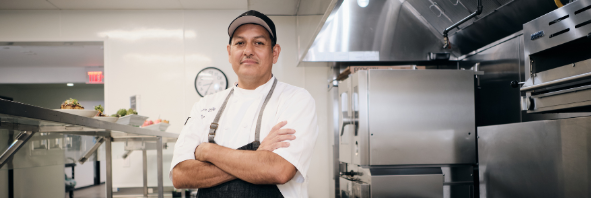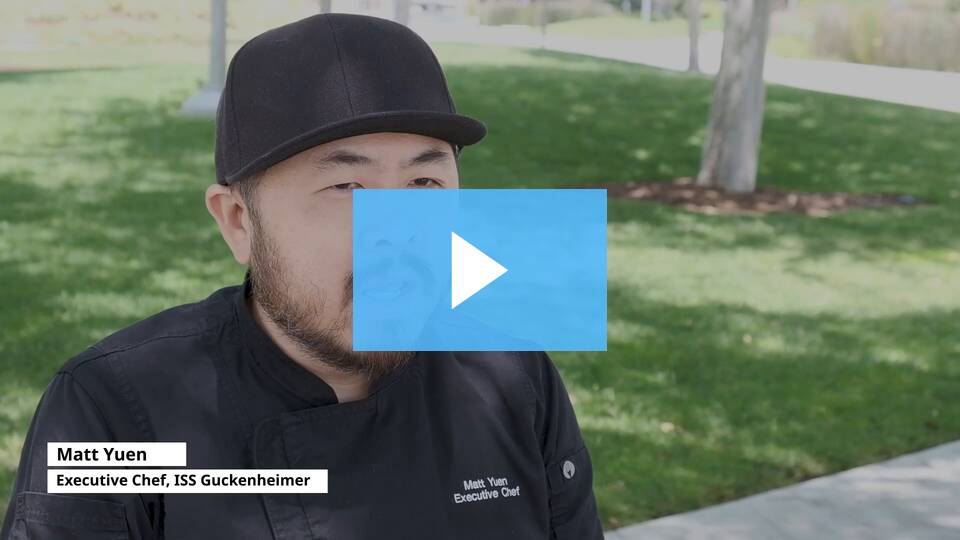
ISS Guckenheimer aims to be the first major caterer in the U.S. to halve food waste. An initial deployment of Winnow has already seen significant reductions in food waste, saving $2.6 million annually and diverting over 1 million meals a year from the trash.
Globally ⅓ of all food from farm to fork is wasted, contributing to approximately 8%-10% of the world’s greenhouse gas emissions. Food waste is an age-old problem for the catering sector. Kitchens are busy, and measuring food waste accurately is challenging. Historically teams simply didn’t know how much they were wasting or which items were being wasted.

ISS has a global target to halve food waste by 2027, three years ahead of Sustainable Development Goal 12.3. Their commitment to running a sustainable kitchen led them to partner with Winnow in 2018. The results ISS Guckenheimer has seen so far have been impressive: 23% waste reduction has saved $2.6 million annually and diverted over 1 million meals a year from landfill across 34 sites.
At first, ISS used to record food waste manually, which was a hectic, time consuming process. Winnow’s technology helps solve this problem by making it easy to record food waste accurately, giving chefs analytics to pinpoint where waste can be reduced.
Winnow’s product suite from Winnow Track to Winnow Transform helps them automate food waste recording and provides a comprehensive view of the types of food waste. Winnow Track is a tablet only solution providing a simple way to track food across smaller ISS kitchens as it’s mobile & non-bulky.
The ISS Guckenheimer team is doing some fantastic work fighting food waste. Through Winnow’s data, Matt Yuen, the Executive Chef, noticed that they were throwing away rotisserie chicken, since then they’ve incorporated that into their soups and salads to minimise food waste.
The team has Winnow Transform, an AI-enabled food waste tracking powered by Winnow Vision. It saves the ISS team time and improves data accuracy. Winnow uses the same technology found in driverless cars. There is a camera positioned over the bin capturing images of food waste. Over time the system learns to automatically recognise food items, and provides analytics based on this data.
Winnow Vision measures food trimmings amongst other types of food waste. One of the ways that the Chef Manager: Art Santillan and his team repurpose food trimmings is by putting the stems of bell peppers and mushrooms into the dehydrator and using the resulting powder to add flavour to soups.
In addition to reducing food waste, ISS Guckenheimer also ensures that they use a variety of locally sourced fresh produce, working exclusively with suppliers that meet the guidelines for agricultural sustainability. To reach its carbon reduction they are also developing menus that expand plant-based options and reduce reliance on meat-based dishes.
Top tips straight from the team at ISS Guckenheimer
- Involve your team in the conversation and make Winnow reports part of your daily huddles to stay on top of your food waste
- Make data visual. If teams can see the amount of waste that is created daily, it will help change their perspective and habits.
- Empower your people. Winnow is a big coaching and learning experience. Give your team the autonomy to act on the data.
ISS Guckenheimer’s commitment to using AI technology to bring about positive environmental, financial, and social change is commendable. In the years ahead, we look forward to continuing the partnership to maximise food waste reduction. Their example shows that with a united team, supported by senior leadership and powered by technology, it is possible to make significant improvements which will deliver positive impact that our world & the climate crisis so desperately needs.
